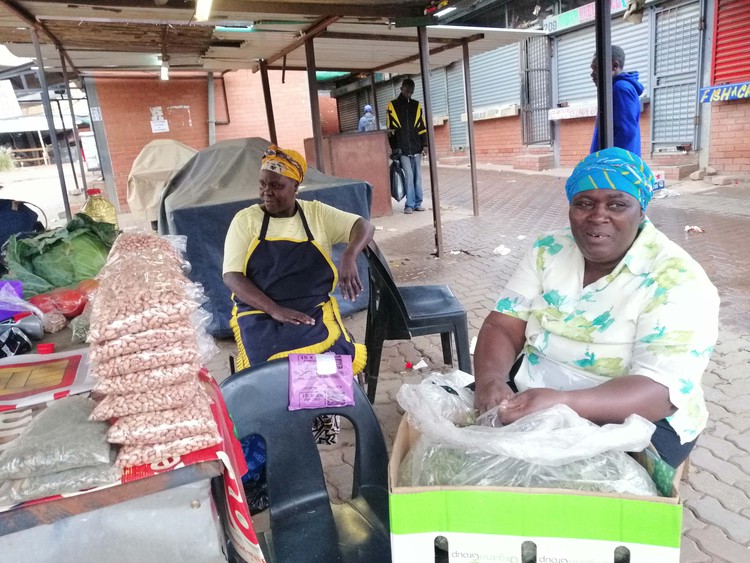Covid-19: Street vendor says she can now feed family of 17 under relaxed regulations
Informal taders selling essential goods and uncooked foods to now operate with a permit during the lockdown
Since the government gave the green light on Thursday for informal traders to operate for the remainder of the lockdown, scores of vendors have rushed to reopen their stores. But many say there is still no clarity on which vendors were allowed to trade.
During an inter-ministerial briefing, Cooperative Governance and Traditional Affairs Minister Nkosazana Dlamini-Zuma gave the green light for spaza shops and street hawkers to only sell essential goods provided they get a permit from their ward councillors or municipality. Previously, informal traders were not deemed essential workers, and were prohibited from trading during the national lockdown to slow the spread of Covid-19.
On Friday, a few street hawkers and informal traders were seen at the busy Mabopane intermodal taxi and bus rank in Pretoria. This rank usually sees about 50,000 commuters weekly. While the numbers of passersby has decreased since the lockdown, which started on 26 March, there is still considerable foot traffic.
Among the vendors was Mary Shabalala who supports a family of 17. She says the relaxed lockdown regulation has come as a relief. She lives in Hebron in the North West next to Mabopane. She has been a street hawker since 1983, and joined hundreds of hawkers at the Mabopane station in 1991.
“When I heard the announcement on Thursday night, I couldn’t wait for sunrise so I came here and started selling. My only source of income comes from selling sugar beans and morogo. The 21-day lockdown announcement was hasty. It did not give enough people to plan ahead,” said Shabalala.
Another vendor, Josephine Mainetja, who sells non-perishable goods and food, said she was concerned about the process to get a permit. Mainetja said they had previously approached the chairperson of Tshwaranang informal traders, an organisation which represents hawkers at the bus and taxi rank.
“We’ve been waiting since this morning for our permits. Our chairperson, Ester Mathole has been in talks with people who manage the taxi rank and we were promised that we would get the permits. We are hungry. Permit or no permit, I’ll be coming back. They can arrest me,” she said.
Vendor Gideon Mlangeni said there was widespread confusion over the regulation. He has run a cellphone and computer repair shop for 15 years. “We all thought the announcement included all informal traders. I guess we will have to wait for 16 April to hear if we will be included,” said Mlangeni.
A circular dated 5 April 2020 on the amendment regarding Informal Food Traders states: “Municipalities must ensure that informal food trading (uncooked) takes place in an area specially demarcated for such purpose; that appropriate hygiene and sanitation services and facilities are provided.”
The municipality has urged vendors to go to the nearest council office to apply for a permit.
Support independent journalism
Donate using Payfast

Don't miss out on the latest news
We respect your privacy, and promise we won't spam you.
Next: Beware these fake claims about Covid-19
Previous: Family facing eviction rejects municipality’s Wendy house
Letters
Dear Editor
I am a concerned informal trader not allowed to work. I sell cooked food in the Rustenburg taxi rank. I would like to know if the goverment is still going to pay us the stipend promised or not because some of us are unable to work. Winter is upon us and our families will need warm clothes. We are restricted to work as the laws of the lockdown do not allow cooked hot food to be sold. We can't claim for the rescue fund for the unemployed. What do we do?
I hope my concern will be heard.
© 2020 GroundUp.
This article is licensed under a Creative Commons Attribution-NoDerivatives 4.0 International License.
You may republish this article, so long as you credit the authors and GroundUp, and do not change the text. Please include a link back to the original article.

